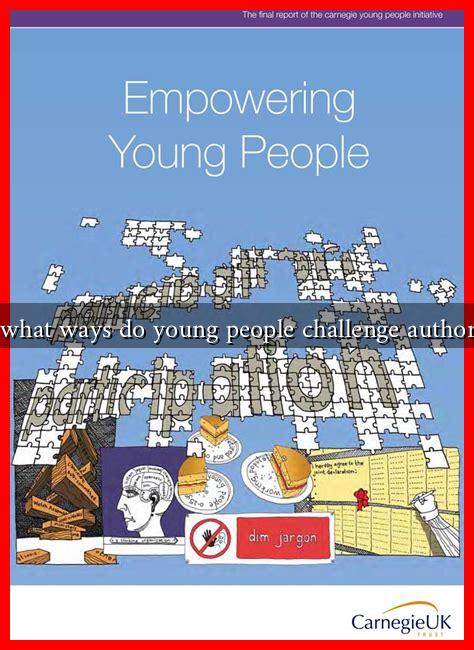-
Table of Contents
In What Ways Do Young People Challenge Authority?
Throughout history, young people have been at the forefront of social change, often challenging established authority figures and systems. This article explores the various ways in which youth assert their independence, question norms, and push for change, drawing on historical examples, contemporary movements, and statistical insights.
The Power of Protest
One of the most visible ways young people challenge authority is through protest. From the civil rights movement in the 1960s to the climate strikes of today, youth have mobilized to voice their dissent against perceived injustices.
- Historical Context: The Vietnam War protests saw a significant youth-led movement that questioned government decisions and military actions. Young people organized marches, sit-ins, and demonstrations, effectively using their collective voice to challenge authority.
- Modern Movements: The global climate strikes initiated by Greta Thunberg in 2018 exemplify how young people can galvanize international attention. Millions of students skipped school to demand action on climate change, showcasing their ability to challenge political leaders and institutions.
Digital Activism and Social Media
The rise of the internet and social media has transformed how young people challenge authority. Platforms like Twitter, Instagram, and TikTok have become powerful tools for activism, allowing youth to organize, share information, and mobilize support quickly.
- Viral Campaigns: Hashtags such as #BlackLivesMatter and #MeToo have gained traction among young people, leading to widespread awareness and action against systemic racism and sexual harassment.
- Online Petitions: Websites like Change.org enable young activists to create and promote petitions that challenge authority figures, from school administrations to government officials.
Education and Critical Thinking
Young people often challenge authority through education and critical thinking. Schools and universities serve as breeding grounds for questioning established norms and ideologies.
- Curriculum Changes: Students advocate for more inclusive and diverse curricula that reflect a broader range of perspectives, challenging traditional educational authority.
- Student Government: Many young people engage in student government to influence school policies, demonstrating their willingness to confront authority directly.
Case Studies: Youth-Led Movements
Several case studies illustrate how young people have successfully challenged authority in various contexts:
- Parkland Shooting Survivors: After the tragic shooting at Marjory Stoneman Douglas High School in 2018, student survivors organized the March for Our Lives movement, advocating for gun control and challenging political leaders to take action.
- Hong Kong Protests: Young activists played a crucial role in the 2019 protests against the extradition bill, using social media to organize and spread their message globally.
Statistics on Youth Activism
Understanding the impact of youth activism can be quantified through various statistics:
- According to a 2020 survey by the Pew Research Center, 57% of young adults aged 18-29 reported participating in a protest or demonstration.
- A 2021 study found that 75% of Gen Z respondents believe that social media is an effective tool for activism.
Conclusion: The Future of Youth and Authority
Young people continue to challenge authority in diverse and impactful ways, from protests and digital activism to educational reform. Their ability to mobilize, question, and demand change is reshaping societal norms and expectations. As they navigate an increasingly complex world, the voices of youth will undoubtedly play a crucial role in shaping the future. The challenge for authority figures is to listen and engage with these young activists, recognizing their potential to drive meaningful change.
For more insights on youth activism and its impact, visit Pew Research Center.

